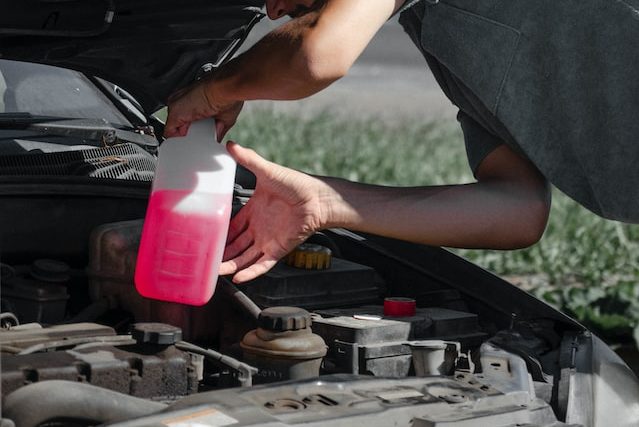
Cargroot is reader-supported. When you buy through links on our site, we may earn an affiliate commission.
No, you can’t mix green and red antifreeze. Mixing the wrong kind of antifreeze can be dangerous to your engine and may lead to poor performance. If you mix the wrong type with regular antifreeze and put it in your car, it can attack the metal components in your vehicle, which will cause corrosion on those parts. This article will look at antifreeze in detail so you know what’s suitable for your vehicle.
What is Antifreeze?
Antifreeze protects your car’s engine from freezing. Several types of antifreeze are available, depending on the climate and conditions where you live. The most common types include ethylene glycol (ETG), propylene glycol (PG), and water-based mixes that contain both.
Antifreeze is essential because it prevents your car’s engine from freezing when it’s exposed to subzero temperatures. When engine coolant freezes, it can damage the engine by breaking off metal pieces or cracking the cooling system’s plastic parts, which can cause significant problems.
How Does Antifreeze Work?
Antifreeze is an integral part of keeping your car’s engine running smoothly. It’s a naturally occurring liquid that keeps the water in your car’s system from freezing and is usually made of ethylene glycol.
Ethylene glycol has two main functions in keeping your car running smoothly. It helps prevent corrosion by acting as an anti-freezing agent in the water system, and it helps prevent corrosion by acting as a corrosion inhibitor in the fuel system.
What Happens When You Mix Green and Red Antifreeze?
When you mix green and red antifreeze, the result is a gel-like substance that doesn’t mix well. This results in your colling system being damaged. Here are some of the problems you will face when you mix red and green antifreeze.
Disrupted Cooling System
When you mix green and red antifreeze in your car, you could disrupt the cooling system. Green and red antifreeze do not mix well, which can cause problems for your car’s cooling system. It creates a harmful chemical reaction that may damage your car’s engine if not fixed quickly.
Damaging the Cylinder Gasket
If you mix green and red antifreeze, you can damage the cylinder gasket. The cylinder gasket is the one that prevents the water and antifreeze from leaking out of your engine into the car’s interior. If this is damaged, your car may have startup problems or other engine issues.
How Often To Change Antifreeze?
First, how old is your vehicle? If it’s less than five years old, you’ll probably want to change the antifreeze every year or two. You’ll probably have to change it every three years or so if it’s older than five years.
Second, how long has your car been sitting idle? If it has been sitting in the garage for a long time, or if it’s been exposed to extreme temperatures, you should change the antifreeze every six months. Third, how cold is the weather? If it’s freezing out, you’ll want to keep an eye on how often you change your antifreeze.
What Should Consider While Changing An Antifreeze?
If you have ever changed your antifreeze, you know that it is a messy process. You first need to drain the old, dirty antifreeze out of your car’s radiator and replace it with new clean antifreeze. Then all you have to do is add water—you don’t want too much or too little, but be careful not to overfill the system. However, some things can go wrong during this process. Here are some things to keep in mind:
1) The first thing to look at is if there are any leaks around the radiator cap or cylinder head where it meets with the engine block. Make sure that these areas are sealed tightly to prevent any water from escaping into the engine bay area of your vehicle.
2) If there is any coolant flowing back into the reservoir after starting up again, then this may mean there was a leak somewhere in your cooling system. Get this checked by a professional to prevent damage to your cooling system.
Conclusion
Many people are not aware of the dangers of mixing antifreeze. It can cause severe damage to your vehicle’s cooling system and other components. It’s best to avoid mixing antifreeze without consulting a professional. Prevention is always better than cure.



![[Solved] Car Shaking in Reverse – Why & How to Fix It?](https://cargroot.com/wp-content/uploads/2023/03/giorgio-trovato-gBF0CCP_Qy0-unsplash-100x70.jpg)


